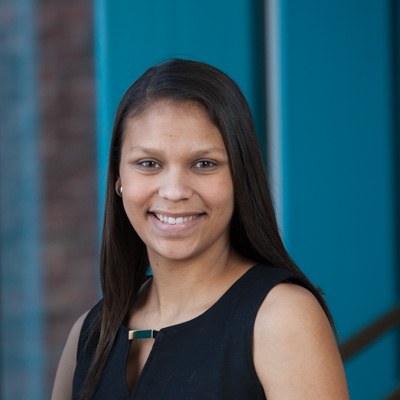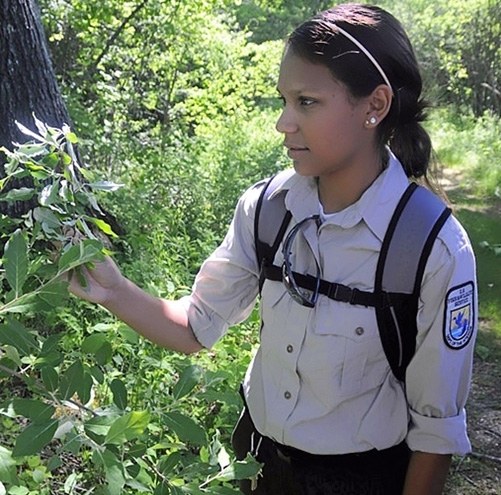Megan Davis Reed (B.S. Wildlife and Fisheries Science, 2012) is helping the Chief of the National Wildlife Refuge System and Assistant Director for External Affairs with a variety of administrative tasks and special projects related to wildlife conservation.

Megan Davis Reed
Q: You've really just started this job. What do you like about it so far?
A: Yes, I actually just started my new position a few weeks ago, so I'm still learning about the different things I'll be doing. But I can tell you that I love the variety of my job. I never realized that my degree would let me do so many different things, and that there are so many things that could be tied to having a bachelor's in Wildlife and Fisheries. And I'm never bored when I go to work. It's almost as if I'm not going to work. It's like, "oh, I'm going to do some fun stuff today."
Q: Can you tell us what you enjoy most about working in your field?
A: I enjoy a variety of things, from managing surveys to looking at landscape conservation projects. I like to look at the bigger picture--so instead of focusing on just one piece of land, I get to see the impact of projects across the country or even globally. In my previous position working at a national wildlife refuge, I was outdoors more, which I enjoyed. But my work now is interesting because I get to see things I might not be able to if I were outside, like policy and how it's made, and understand bigger management decisions and how decision makers come up with them. And I still get to interact with people regularly, which is wonderful. In my previous job, a lot of the people I met were members of the community and visitors to the national wildlife refuge. People would come out to explore the visitor's center and hike the trails. I got to meet a lot of diverse people that way, and I got to answer a lot of different types of questions. In my new position, I still deal with a lot of different people--I answer a lot of phone calls from concerned citizens who found an injured bird or people inquiring about wildlife policies, for example. I'm still interacting with the community, just in a different way, and I love it.
Q: How did your background play a part in getting you interested in wildlife and Ag?
A: Well, I was always an outdoorsy kid. I was the one who wanted to catch snakes and put them in my mom's bathtub because she was terrified of them, which I thought was hilarious. But growing up, I never thought that I could make a living being outside and conserving what I enjoy so much. Realizing that I could transform my passion into a career made it easy to really enjoy my studies and classes. Also, I was in a military family--we moved every two years. So moving around to take the different positions I've been offered has been extremely easy for me, because that's what I grew up doing. If I didn't move every once in a while, I'd probably get bored!
Q: Once you realized you could work in wildlife, how did you pick Penn State's program?
A: When I was in high school I worked at a national wildlife refuge, and I was trying to decide whether to pursue wildlife studies or become a doctor and look for a cure for cancer. A coworker told me, "You know, you could actually think about making this your career," and I decided it was a real possibility for me. So when I started looking at colleges, I looked for some that had wildlife-related programs. I ended up coming to Penn State for a weekend and got to stay with a host student and really experience college life. That's what made me feel like I wanted to be here. I didn't know anyone here, and I'd never been here before, but I really felt like this was where I belonged. It sounds cliché, but choosing Penn State just felt like coming home. It was perfect for me.
Q: How were you able to find your place in undergrad?
A: There is that thought, sometimes, "If you come to Penn State, you're just going to be one in a sea of people." That's so far from the truth. If you choose to, you can absolutely make your own community here. The College of Ag Sciences is smaller, at least within the context of the university as a whole, and then within that, you have your own major and programs and activities to make it even less intimidating. I was in The Wildlife Society, and we had a lot of members, with maybe 30 of us being really active, and it was great to have that group. You take program-specific courses with the other members--and those are smaller classes, they're not the big 700 student ones--so we all got to know each other. And the professors participated in The Wildlife Society as well. They would come to some of our meetings and events, and they were interested in what we were talking about and willing to give us their opinions.
Q: Were there any other organizations or activities that you really enjoyed?
The Ag Advocate program made a huge difference in my Penn State career, especially within the College of Ag Sciences. It helped me network with different people, whether that meant meeting alumni or other people through events where I would represent the college. It taught me a lot about how to be professional and introduced me to the kinds of scenarios I might encounter when I graduated.
Q: Was there a particular moment you knew Penn State College of Ag Sciences was right for you?

On my first visit to Penn State, I was accidentally scheduled to visit the biology program in the Eberly College of Science. Luckily they were able to switch me over to the wildlife program in the College of Ag at the last minute, but no one was expecting me per se. Vickie Clauer, who worked for the Ag administrative office, really connected with me. She didn't have me on her schedule, and I was a little terrified when I first got here, but she was so helpful to me. I didn't know where anything was, and she would take me to one location, then tell me to call her when I was done, come meet me, and show me where the next place was. I actually maintained a relationship with her throughout my entire Penn State career--I called her my Penn State mom. If I did great on an exam, I would come into the administrative office the next day, and she would have baked me something. Back home in Virginia, my high school was one hallway, and I had 78 people in my graduating class, so sometimes I felt lonely in the crowd at first. But having Vickie be there for me gave me the confidence to think, "I can step out here at Penn State."
Q: It sounds like Penn State was the perfect place for you. If you ever have kids, would you advise them to check out Penn State?
I would be proud if my future child decided to go to Penn State. Obviously I wouldn't force them to pick any particular school, but I would just make sure that they're aware of everything that it's possible to do at Penn State. Whether it's just at Penn State, or within the College of Ag Sciences, the programs here can help you get into any career you might choose. I would definitely encourage any prospective student to find out as much as they can about the different programs that are offered.
Q: What advice do you have for students, and particularly minority students, who are interested in Ag?
It's no secret that agriculture isn't the most diverse area of study you could choose, but there are certainly minorities in a lot of different agricultural fields. But more importantly, if it's something you're interested in, go for it. Just because there aren't a ton of people who look like you, sound like you, or dress like you, doesn't mean it's something you can't do. Follow what you want to do--and there will be nothing to hold you back.
Q: What do you think was the key to your success at Penn State?
A: Personally, I've had a lot of opportunities and haven't been afraid to take advantage of them. I graduated from college in 2.5 years because I had a lot of credits already from my high school. But in that time, I was able to join The Wildlife Society and MANNRS (Minorities in Agriculture, Natural Resources and Related Sciences), represent on the College of Ag Sciences and ESM student councils, be an Ag Advocate, and play intramural basketball and football for 2 different teams! And while not every one of those experiences was as great as every other, I didn't miss out on anything. In the end, I was able to figure out what I did and didn't like as well as gain some great experience.

